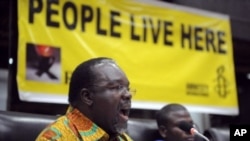Housing ministers, officials, and other delegates met in Kenya’s capital Thursday for a pan-African housing and urban planning conference. This year’s theme focuses on the link between climate change and basic infrastructure.
Joan Clos, executive director of the United Nations Human Settlements Program, known as U.N. Habitat, told reporters in Nairobi that Africa is now the fastest-urbanizing area in the world. The U.N. agency projects that the continent’s urban population will triple in the next 40 years.
According to Clos, most of the growth will take place in middle-sized cities of 500,000 to one million people rather than in capital centers.
He said the huge jump in energy prices signals what he calls a “new era” in urban planning, especially with the presence of climate change.
“In the city, we consume a lot of energy," said Clos. "We consume a lot of energy for transportation, for industrialization, for buildings, for heating and cooling, and the cities are going to be different due to the change of energy prices.”
The fourth annual African Ministerial Conference on Housing and Urban Development opened in Nairobi Thursday, attracting delegates from governments, housing authorities, urban planning departments, and others in countries across Africa.
Kenyan Housing Minister Soita Shitanda told reporters delegates would be sharing experiences of problems in urban areas such as the growth of informal settlements, or “slums,” and legislation governing urban development.
“So I think what we are basically concerned with as a caucus of African countries is to try and create programs within the urban areas that can be able to deal with those problems, mainly of course housing and other related infrastructure within the urban areas,” said Shitanda.
Solomon Tekie, a manager in Namibia’s National Housing Enterprise, described to VOA what he is hoping to get from the conference.
“How can we actually use renewable energy and things that we already have? We have the sun throughout the year, 24/7, why not? Not only using them, but helping people learn about how to use renewable energy that we have rather than looking for things that we do not have, which are quite expensive and we are not able to maintain them,” said Tekie.
Some delegates told VOA that their big concern is massive traffic congestion in their cities, a concern echoed by U.N. Habitat’s Clos.
“That should be dealt with [through] better urban planning, especially the increase of the width of the streets and the interconnectivity of the streets," said Clos. "It is also [something] that we are considering very much, because a better traffic management implies less energy consumption.”
On the sidelines of the conference, Amnesty International held sessions discussing human rights violations committed by governments against people living in slums. These include forcible evictions and lack of basic services such as clean water and schools.




